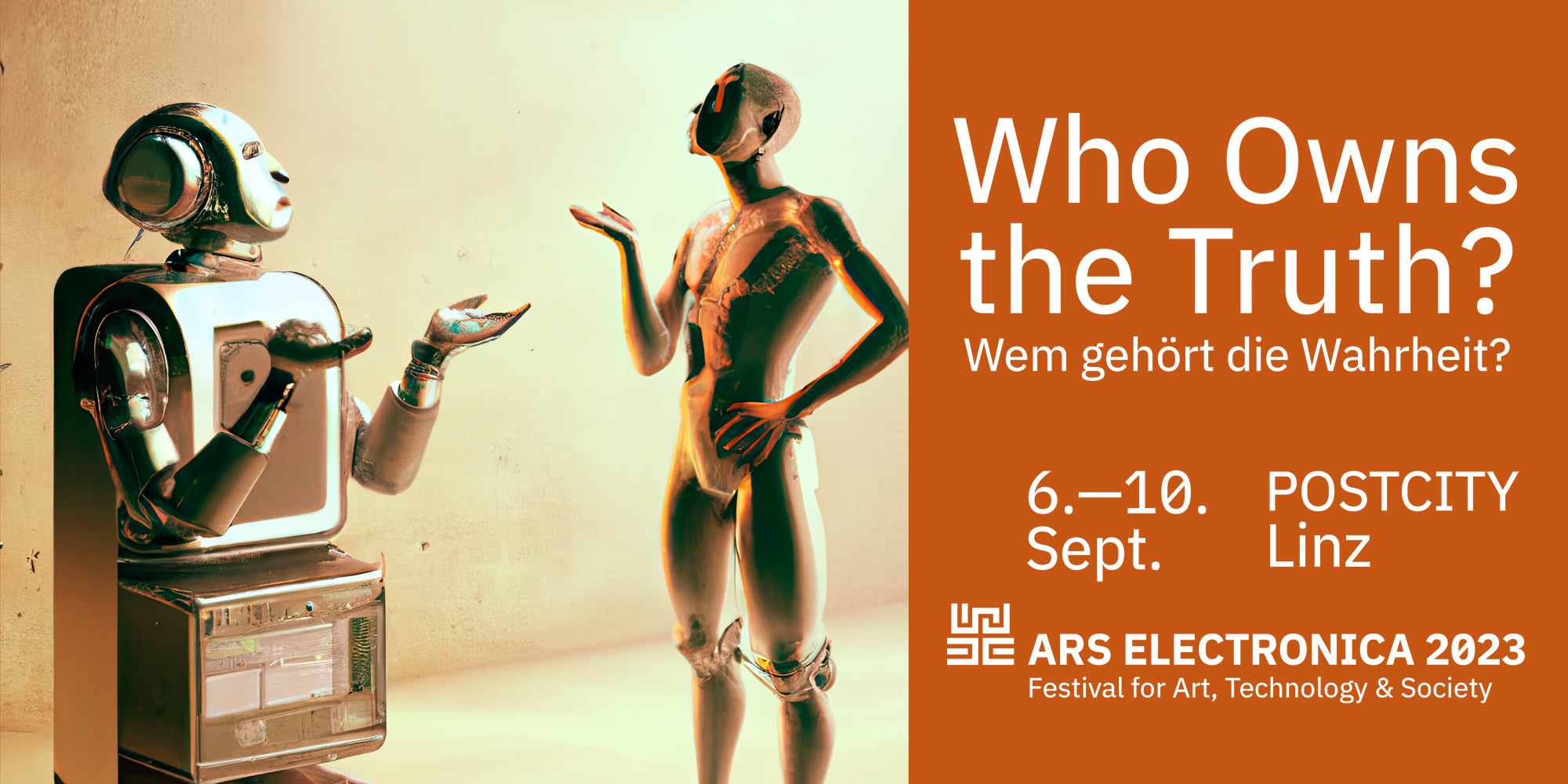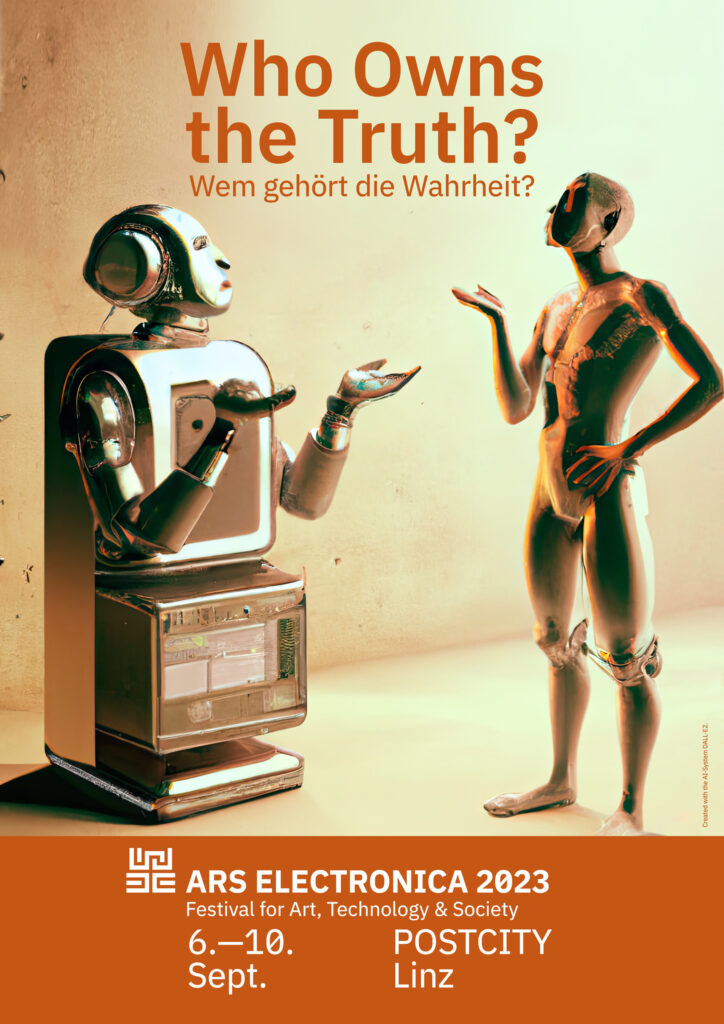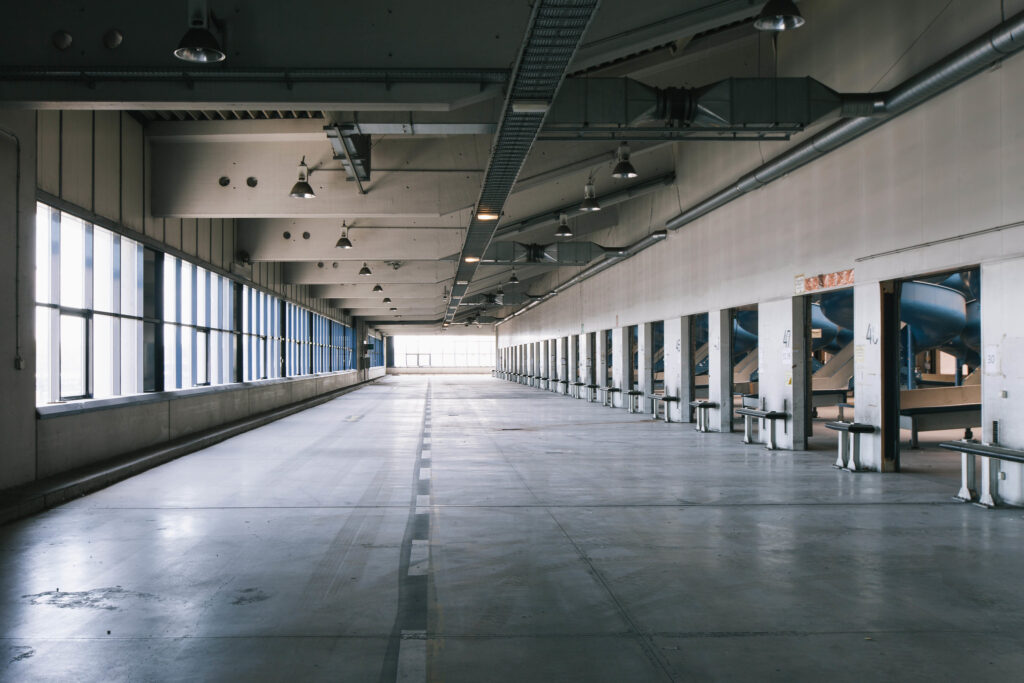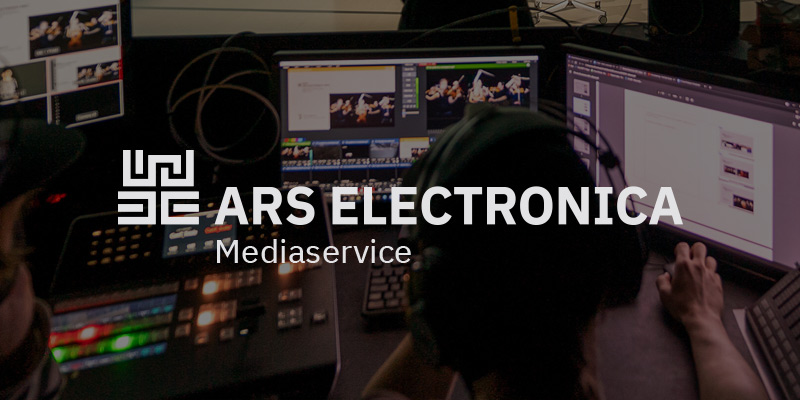- Press text as PDF
- Press conference via Youtube
- Festival-Website
- Trailer POSTCITY
- Ars Electronica 2023 Photo Collection
- Press accreditation 2023
Who Owns the Truth?
Festival for Art, Technology and Society
September 6 to 10
Linz, Austria
(Linz, April 17, 2023) From September 6 to 10 2023, Ars Electronica once again invites artists, scientists, developers, designers, entrepreneurs, and activists from all over the world to Linz. The question focused on by Europe’s largest festival for art, technology and society is: “Who Owns the Truth?” The central location is — again — the legendary POSTCITY, in which the festival was already able to guest-host from 2015 to 2019.
Once again in POSTCITY
Never say never. After “finally” saying farewell to the location in 2019, the legendary POSTCITY will after all once again provide the venue for Europe’s largest festival for art, technology and society in 2023. “The Post AG has been a partner of the Ars Electronica for many years,” according to Christl Baur, Head of Ars Electronica Festival. “When we began talks on cooperation for this year, suddenly the chance of once again using the POSTCITY was on the table — an offer we couldn’t turn down!”
Why, is easy to explain: the POSTCITY is large, spectacular, and lies in the city center. With 80,000 square meters usable space spread over several levels, a 4,000-meter long parcel distribution facility, a storage unit for 10,000 packages, an entire battery of 12-meter high spiral chutes, and a rail track hall that is around 240 meters long made for both incoming and outgoing railways, the post distribution center that was abandoned in 2014 offers almost limitless opportunities for artistic stagings by Ars Electronica.
“Nowhere else could the festival unfold and develop as it has in POSTCITY,” says Martin Honzik, chief curator of the Ars Electronica exhibition and festival team. “The vast halls and extensive catacombs almost challenge curators and artists to come up with special things. It is a matter of transforming a decommissioned, unproductive, and cold industrial building into a lively and inspiring laboratory of the future where a broad audience and experts from all possible disciplines, industries, cultures, and countries can meet and engage in conversation.”
Festival Mile in Linz’ inner city
POSTCITY will be the central and southernmost location of a festival mile that will run along the Landstraße through the center of Linz. The Mariendom in the Domviertel, the Tabakfabrik, the Art University at Hauptplatz, the LENTOS Art Museum on the Danube, the Salzamt Atelierhaus, the Anton Bruckner Private University at the foot of Pöstlingberg, as well as the Stadtwerkstatt and the Ars Electronica Center on the northern bank of the Danube will be played at.
Festival partners from all over the world
“At all these locations, exhibitions, concerts, performances, screenings, lectures, and conferences will be on display, designed and brought to Linz by artists and institutions from all over the world. ‘The list of participating partners is long, and it is growing longer every day,’ says Christl Baur with excitement.”
This year, the festival has secured exciting partnerships with leading names in the arts and culture industry, such as the Museo Nacional del Prado and the Museo Nacional Centro de Arte Reina Sofia in Madrid, the Grand Palais Immersif in Paris, the Salzburg Festival, and the Biennale Musica 2023 Venezia. Additionally, renowned organizations like MEET Digital Culture Center in Milan, WRO Media Art Biennale in Wrocław, Leonardo – The International Society of Arts, Sciences, and Technology, and Arizona State University will also be participating. Notably, two European Capitals of Culture, Bad Ischl 2024 and Oulu (Finland) 2026, will also be involved in the festival this autumn.
“As part of the commissioned projects, we are also working all year round for and with art institutions from around the globe,” Christl Baur points out. In 2023, these institutions will be, for example, the Cisneros Fontanals Art Foundation (CIFO) in Miami, the Arts Council Korea (ARKO) in Seoul, the Swiss Arts Council Pro Helvetia in Zurich, the Institut Ramon Llull from Barcelona or the Ministerio de las Culturas, las Artes y el Patrimonio as well as the Ministerio de Relaciones Exteriores de Chile in Santiago de Chile. Another international network project is “State of the (ART)ist”, which is carried out in cooperation with the Federal Ministry for European and International Affairs.
The partnership with Johannes Kepler University Linz, which has been deepened between 2020 and 2022, will be continued and also be part of the festival program this year. Visitors to the festival can also look forward to another great concert night in the halls of POSTCITY, which will be performed in collaboration with the Bruckner Orchester Linz.
“An important cooperation platform has formed around the prestigious Prix Ars Electronica, which is once again the mainstay of the festival this year. The S+T+ARTS Prize, the European Commission’s grand prize for innovation at the interface of art, technology and science, which Ars Electronica has been organizing since 2016, has been joined by other attractive awards and competitions,” says a pleased Veronika Liebl, who is responsible for the great success of Ars Electronica’s European collaborations.
Particular importance is attached to the highly endowed “European Union Prize for Citizen Science” as well as ” Klasse! Lernen. Wir sind digital.” and the “Digital Humanity Prize”.
The international cooperation network set up around the Prix Ars Electronica includes BOZAR, WAAG, La French Tech Grande Provence, INOVA+, T6 Ecosystems SRL, the Frankfurt Book Fair, King’s College London, the European Science Engagement Association (EUSEA), NESTA, Science for Change (SfC), ZABALA INNOVATION CONSULTING, S.A., and Austrian Federal Ministry of Education, Science and Research and Austria’s Agency for Education and Internationalization (OeAD) as well as the Austrian Federal Ministry for European and International Affairs.
The European network of Ars Electronica is becoming increasingly complex and extensive. The consortium for Culture & Creativity, initiated by the European Institute of Innovation and Technology (EIT), alone bundles 60 institutions from 15 European countries. The first interim results of the “Next Renaissance” aimed for by this network will be presented in Linz in September.
Artistic projects that have emerged as part of the European Media Art Platform, made possible by partners such as IMPAKT in Utrecht, Onassis Stegi in Athens, Werkleitz in Halle, LABoral Centro de Arte y Creación Industrial in Gijón, or the WRO Art Center in Wrocław, will also be presented. An exhibition will be brought to the festival in Linz together with Waag in Amsterdam and the European initiative More-than-Planet. Last but not least, the kick-off of the new “European Digital Deal Network,” which Ars Electronica has initiated with 12 European partner organizations such as Kersnikova in Ljubljana, the Zaragoza City of Knowledge Foundation, Culture Yard in Helsingør, or the Center for the Promotion of Science in Belgrade, will also take place here.
Initiated in 2002 with the Linz Kunstuniversität, the Ars Electronica Campus again invites universities from all over the world. Center stage this time is held by the Taipei National University of the Arts, with additional participation already confirmed by the University of Auckland, the University of Applied Sciences Berlin, the Art & Technology Studies Department of the School of the Art Institute of Chicago, the Korea National University of Arts | K-ARTS, the Hong Kong University of Science and Technology, the Universidad Austral de Chile, the Vilnius Academy of Arts, the ECAL École cantonale d’art de Lausanne and Hexagram from Montreal.
The Linz Festival for Art, Technology and Society also exerts great international appeal on innovators from business and industry. This year’s partners once again include the major Japanese media agency HAKUHODO Inc. Tokyo, the Art Collection of Deutsche Telekom, Hyundai Motor Group from Korea, as well as the “Accelerator Program” of the CultTech Association.
The Ars Electronica Festival 2023 is funded by the City of Linz, the Austrian Federal Ministry for Arts, Culture, Public Service and Sports, as well as the state of Upper Austria, and numerous sponsors and partner institutions.
Gerfried Stocker
Artistic Director Ars Electronica
Who Owns the Truth?
Wem gehört die Wahrheit?
The theme of Ars Electronica in 2023, this year formulated as a question, aims directly at key disputed topics of our time: truth and ownership, interpretive authority and sovereignty. Can truth be owned? Is there a right to truth and if it does belong to someone, what control and responsibility are associated with it?
How do we ask ourselves such questions in this age of global interconnectedness and the rapidly developing performance of so-called Artificial Intelligence? In an age, moreover, in which a small number of people, in neo-feudalistic fashion, have usurped the management of collective knowledge, and in which we also have good reason to doubt whether the vision of technology represents the solution to our problems.
Behind this lies the central question as to how we can make the fantastic achievements of science and technology accessible for ALL people – and usable. It is not enough just to think about how we can prevent AI systems from harming someone (even though that is vitally important). A tool that is so much based on the globally collective “raw material” of knowledge, creativity etc., must be harnessed to the benefit of all, too.
In recent years, we have thought a great deal about “Digital Humanism”; it is time now to think about a form of “Digital Socialism”, meaning a “commonwealth”, a “social contract” with which we can overcome the profound, wide-ranging changes of the digital age, and even more, the globally collective consequences of climate change.
Admittedly, this is a nearly insurmountable challenge, yet it is just for such a vision that a festival like Ars Electronica should and can stand. A festival that is extraordinary in every respect, at which for more than 40 years under the heading “art, technology and society” thought has been given not only to how technology alters our society, but also to revealing how art and society can themselves shape technology.
Ars Electronica 2023 – what’s it about?
It’s about truth as a manifesto of interpretive authority and sovereignty, about dealing with the loss of the claim to “the” truth and thus, that we have to get used to thinking of truth as plural.
It’s about truthfulness as the basis of the values of the “authentic” and “original” as we perceive them, and how these terms have already been transformed in the digital realm.
It’s about the collective synchronization of perception as a strategy for fake information and conspiracies in the social media and the machinations of the lobbies and large-scale industry, from influencing the scientific bases of man-made climate change to the deceptions of the diesel scandal.
It’s about freedom of speech and opinion, about how we deal with obvious liars, right up the very highest offices of state, and how we deal with people who publish unpalatable truths, such as Edward Snowden and Julian Assange, for example.
It’s about whether the truth is acceptable to people and about the significance of scientific insight and evidence.
It’s about the concept of ownership and the right to profits from intellectual work and performance in the transition from the automation of machines to the autonomisation of knowledge and content generation – from digital copy and paste to cultural appropriation in a globally networked world. Intellectual Property and Copyright, as the central pillars to date of the content and creative industry, are already no longer able to reflect adequately the changes in digital networking – never mind all that is coming our way with the systems of OpenAI, etc.
But it’s also about the concept of ownership as it relates to nature, going beyond the centuries-old philosophical and legal debate; it’s about the factual reality of the exploitation and destruction of nature as an unremitting burden being transferred to following generations.
And, of course, it’s about all that we believe, fear or hope will change in the wake of so-called Artificial Intelligence.
But in its essence, it’s about demonstrating how artists from all over the world, through collaboration as well as confrontation with technology and society, are working on this topic. In association with the prize-winners of the Prix Ars Electronica, the projects arising from the many local, European and international cooperations and networks, the curated theme-based exhibition and newly commissioned works, concerts and performances, symposia and workshops.
The Ars Electronica Festival
Ars Electronica has accompanied the ongoing digitalization of our lives since 1979. It poses questions about the political, social, ecological, and economic consequences, and speculates on the future forms that technological progress will take. Embedded in a worldwide network of artists, scientists, developers, designers, entrepreneurs, and activists, Ars Electronica constantly advances this research – both within and together with the widest possible public. Whether with exhibitions, conferences, concerts, performances, or interventions – the goal has always been to push forward a discourse and promote inclusive and sustainable visions of the future.
Website of the Festival: https://ars.electronica.art/who-owns-the-truth/en/






